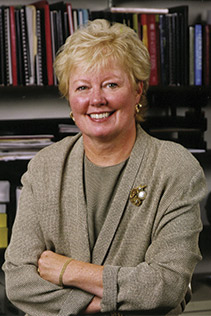
During a nursing career spanning more than 30 years, Joanne Disch, PhD, RN, FAAN, has held numerous positions in clinical and academic nursing, but she has always maintained a strong commitment to professional organizations—including serving as a member of the board of the American Academy of Nursing and as a committee chair with the American Nurses Association. Her most recent board position, however, might be her most high-profile yet—chair of the board of AARP, formerly the American Association of Retired Persons, one of the largest and most influential interest groups in the country.
Disch, who is the director of the Katharine J. Densford International Center for Nursing Leadership at the University of Minnesota, earned her master’s degree in cardiovascular nursing from the UAB School of Nursing in 1976 and is the 1994 recipient of the SON’s Distinguished Alumni Award. She joined AARP’s board of directors six years ago and in 2006 ascended to the position of the board chair, where her two-year term ended this past May. She says casual observers might be surprised to find out just how vital her nursing background was to her chair duties.
“Nurses are very skilled at quickly assessing situations on a short time frame, coming up with possible solutions, getting along with a wide variety of people, and seeing what’s going to work for the average person,” she explains. “Some of my colleagues were senior VPs, very prominent people, but I think nurses can help shape policy so that the average person understands it and supports it.
Over the course of Disch’s board tenure, AARP was involved in two of the most contentions public-policy debates in decades—first the controversial Medicare Prescription Drug, Improvement, and Modernization Act of 2003, and later the privatization of Social Security, which AARP opposed in 2005. More recently, AARP has been working with both the current president and the 2008 candidates on the hot-button issue of health-care reform. “We’ve done major pushing to get support for some of the things they’re trying to do in California in terms of trying to pick up people who are uninsured, “she says.
Despite the general perception of AARP as being only for seniors, Disch says the organization is increasingly focusing on issues affecting people under 50—particularly younger Americans who find themselves in the role of primary caregiver for their elderly parents, as well as the millions of children whose guardians are their grandparents. “Around four million grandparents are the sole providers for their grandkids, so the rights of grandparents are obviously a real concern for us,” she says.
In each of those instances, the ability to view the issue through the “nursing lens” has broadened her knowledge and leadership skills, Disch says. “Nursing is like running small businesses all over the place,” she explains. “While the core is still taking care of the patients and their families, that’s expressed in so many different ways and even those of us who are no longer taking care of patients are using those skills. That skill set—being able to see the big picture—can be used anywhere.”
Disch, who went on to earn her PhD from the University of Michigan, credits her SON professors, particularly Marguerite Kinney, DNSc, for being “wonderful mentors” who gave her the resources to succeed much later on in life. However, she remembers her fellow students—one of who was current UAB president Carol Z. Garrison—as being a special group, too.
Disch says that she sees that same “collegial spirit” at the SON when she looks at the school today. “When I get the alumni magazine and see what’s going on at UAB, I can tell that the students are being taught to see things through that ‘nursing lens’ and that they’re learning how to skillfully apply that to other situations,” she says. “What’s going on at UAB now is very impressive.”
